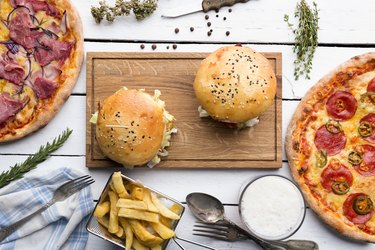
Preservatives in foods are designed to prevent bacteria growth, spoilage and food separation, but not all preservatives are good for you. The effects of food preservatives vary. depending on your age and health, but the negative effects of some preservatives are worth considering when you eat processed foods.
Are Preservatives Bad for You?
Video of the Day
One of the advantages of food preservatives is you don't have to worry about the food spoiling quickly before you have a chance to eat it. Processed foods have additives to increase shelf life and make food more convenient. Additives like nitrites also add color, which makes the food look more appealing.
Video of the Day
The goal behind food preservatives is to make food safer, according to Food & Nutrition Magazine. Sometimes it's the amount of food preservatives that matters. Eating small amounts of food additives may be safe, says the Cleveland Clinic. But if you eat a lot of processed foods, you may be increasing your odds of having obesity or being diagnosed with high blood pressure, heart disease or cancer.
Frozen foods are processed, but they don't always have additives. Frozen spinach may be just that, spinach. The International Food Information Council Foundation says freezing meat and produce is physical, not chemical, food preservation. It's the chemicals used as preservatives that can cause problems, says the March 2013 issue of the International Journal of Pharmaceutical Sciences and Research.
Preservatives to Limit
You should consider limiting certain food preservatives and additives, according to Cleveland Clinic and Berkeley Wellness. These include:
- Sodium nitrites. Nitrites add color and flavor to preserved meat. The problem comes when nitrites are heated or mix with stomach acid. They produce nitrosamines, which are linked to an increased risk of colon and pancreatic cancer.
- Sulfites can trigger asthma. Sulfites are banned on fresh fruits and vegetables in the U.S. but are used in other foods. Sulfites may be present when the label says sulfur dioxide, potassium bisulfite, sodium bisulfite or sodium sulfite, so it's best to avoid these ingredients.
- Trans fats or partially hydrogenated oils. These are banned in the U.S. because of their link to heart disease.
- BHA (butylated hydroxyanisole) is a solid used to preserve butter, lard and meat. Berkeley Wellness says this common ingredient is found in bags of chips, vegetable oils, cereal and cookies. Its role is to prevent food from becoming rancid. The National Toxicology Program says BHA may be a human carcinogen. Berkeley Wellness says other research is mixed but suggests limiting BHA.
A February 2015 study in the journal Nature says emulsifiers used in mayonnaise, ice cream and other foods to keep ingredients from separating may alter gut bacteria, potentially leading to inflammatory bowel disease.
Read more: The Most Common Food Preservatives
What to Do Instead
Harvard Health Publishing says preservatives are everywhere and impossible to avoid completely. Parents of young children should buy and serve more fresh and frozen fruits and vegetables and fewer processed meats.
Some other suggestions from Harvard Health Publishing and Cleveland Clinic include:
- Cut back on processed foods.
- Read labels and learn what's in the food you buy.
- Shop at farmers markets or sign up for Community Supported Agriculture deliveries of fresh produce.
- Cook most of your meals and avoid pre-packaged, precooked meals.
Read more: How to Avoid Processed Foods and What to Eat Instead
The Bottom Line
The Food and Drug Administration doesn't allow preservatives to conceal damage or inferiority, says dietitian Kathleen Zellman, writing in the March 2017 issue of Food and Nutrition Magazine. But it does allow sodium nitrites to inhibit the growth of mold on preserved meats.
She also suggests limiting nitrites, sodium benzoate, sulfates and BHA. Emerging technologies, she writes, may someday replace the need for harmful preservatives.
- Food & Nutrition: "The Vital Role of Food Preservatives"
- Berkeley Wellness: "Two Preservatives to Avoid?"
- Cleveland Clinic: "5 Food Additives You Should Avoid"
- Harvard Health: "Common Food Additives Harmful to Children"
- International Journal of Pharmaceutical Sciences and Resarch: "Artificial Preservatives and Their Harmful Effects: Looking Toward Nature for Safer Alternatives"
- International Food Information Council Foundation: "The Benefits of Preservatives in Our Food"
- Nature: "Food Preservatives Linked to Obesity and Gut Disease
- Toxicology Data Network: "Butylated Hydroxyanisole"